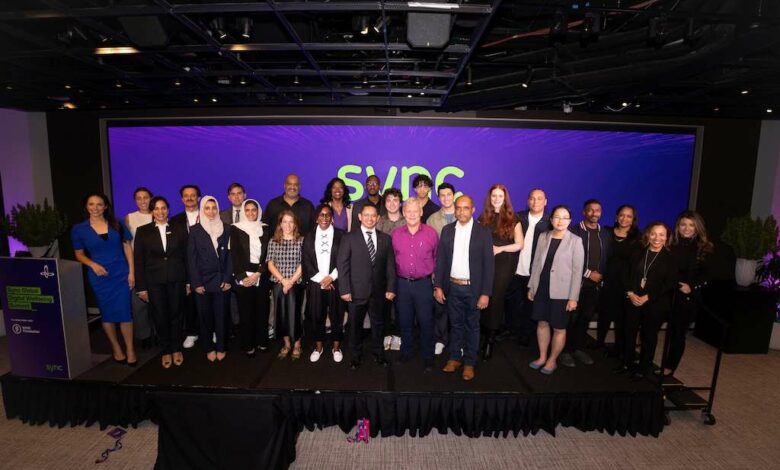Ithra’s Sync Launches Global Report on the Digital Wellbeing of Gen Alpha at UNGA 80

Riyadh – Asdaf News:
The King Abdulaziz Center for World Culture (Ithra), an initiative by Aramco, unveiled on September 21, a first-of-its-kind global study, “Lives Lived Online: Gen Alpha and Families in the Digital Age.” Developed by Sync, Ithra’s digital well-being initiative, the report was launched during Sync’s summit at the 80th United Nations General Assembly (UNGA 80) in collaboration with the World Health Organization Foundation.
“This report is important because it amplifies the voices of Gen Alpha parents from around the world, over 42 countries, and that makes this a truly global study and even a global opinion of these parents,” said Fahad Al-Beyahi, lead Sync Global Digital Wellbeing program at Ithra.
“It reveals a significant concern of parents around the use of digital technology and the future of Gen Alpha. These concerns include the impact of digital technology on culture, heritage, and on their mental health and wellbeing,” he said, adding: “The concern is not about screen time, but rather, the parents’ greatest concern is around the harmful and adult content. But they are also deeply optimistic, excited by the future possibilities of technology, and how it can help enable their children.”
The Sync Summit, held alongside UNGA 80 in New York, explored how to design a more humane digital future where connectivity and human flourishing go hand in hand. Guided by the theme Humane Digital Future: Well-Being for All, the Summit frames digital well-being as a global health and wellbeing priority. From Gen Alpha (children born between 2010 -2024) navigating AI-driven platforms to under-connected communities just coming online, the conversations reflected the realities and challenges of our connected age. The program included the launch of Sync’s Global Gen Alpha Digital Well-Being Report, offering nuanced evidence to guide action.
“Gen Alpha are the children of millennials, and the young siblings of Gen Z. They have two generations who are fully immersed, live with technology and the technology shapes and impacts their lives,” said Al-Beyahi.
The World Health Organization shared insights on digital determinants of health, from promoting public health messages through apps and games and tackling misinformation, to achieving digital balance. In collaboration with the WHO Foundation and echoing UNGA’s call for “Better Together,” the dialogue was enriched by the youth voices, community perspectives, and transformative policy ideas. Together, these contributions work towards a healthier, more inclusive, and human-centric digital future, grounded in cooperation and shared responsibility.
Summit highlights:
- Launching Ithra’s Sync Gen Alpha Global Report
- A keynote by Anil Soni, CEO of the World Health Organization Foundation.
- A keynote by Alain Labrique, Director, Department of Digital Health, WHO
- An expert panel discussing the Gen Alpha Global Report
- Spotlight: Gen Z Voices Shaping Gen Alpha’s Future
Undertaken over two years, the Gen Alpha Global Report draws on the lived experiences of respondents across 42 countries. This report brings together the voices of children, their parents, and the professionals who serve them. Through surveys, in-depth interviews, and community-led conversations, it explores what it means to raise, teach, and care for Gen Alpha in an age of near-constant connectivity. Among the report’s most compelling findings:
- Parents now rank digital literacy and safe internet use as more important than academic performance or financial skills.
- 54% of parents say adult content is the most damaging threat their children face online, shaping not just what they see, but who they become.
- 52% believe social media has the strongest negative impact on their child’s mental health.
- 79% believe their children will compete with AI for jobs, while 61% expect them to work in professions that don’t even exist today.
- 69% of parents say financial security drives their hopes for their child’s future career, and 47% fear their children may need to leave their country to achieve it.
- 61% of parents admit digital technology has worsened family life overall, despite 81% banning devices at mealtimes to protect family connections.
- 80% of parents believe screens are keeping children indoors and eroding empathy, community values, and moral grounding.
What’s clear is that families are no longer passive users of technology – they are the architects and active co-creators of their own digital lives. This report captures their hopes, tensions, and ideas, offering insights and recommendations for those building the platforms, systems, and societies that Gen Alpha will inherit. This conversation is about so much more than screen time. It is about families, children and childhood – and the possibility of shaping a digital future where technology is healthful and families flourish.




